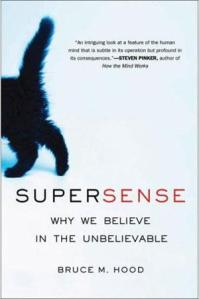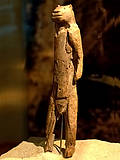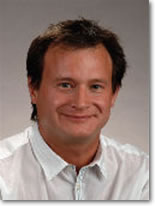 Few topics in psychology are gaining more momentum than the origin of religious beliefs. Questions of whether we’re born with neural apparatus that predisposes us to belief, or whether we learn to becomes believers, or some combination of both, are on the minds of researchers from all quarters. Bruce Hood, experimental psychologist at Bristol University, is a groundbreaker among the curious. In his new book, SuperSense: Why We Believe in the Unbelievable, Hood argues that we are each born with an innate “SuperSense” rooted in our capacity for intuitive reasoning. Drawing on recent research and historical examples, Hood convincingly makes a case that supernatural belief arises spontaneously well before cultural influences assert themselves.
Few topics in psychology are gaining more momentum than the origin of religious beliefs. Questions of whether we’re born with neural apparatus that predisposes us to belief, or whether we learn to becomes believers, or some combination of both, are on the minds of researchers from all quarters. Bruce Hood, experimental psychologist at Bristol University, is a groundbreaker among the curious. In his new book, SuperSense: Why We Believe in the Unbelievable, Hood argues that we are each born with an innate “SuperSense” rooted in our capacity for intuitive reasoning. Drawing on recent research and historical examples, Hood convincingly makes a case that supernatural belief arises spontaneously well before cultural influences assert themselves.
I recently spent a few minutes with Professor Hood discussing his SuperSense theory and other topics from his book.
DiSalvo: What is the “SuperSense”?
Hood: The SuperSense is a set of related beliefs that there are hidden dimensions to reality manifesting as energies, patterns and forces accounting for paranormal claims and experiences.
How would you describe these “hidden dimensions to reality”?
Hood: People infer from their experience that there are hidden forces, energies and entities operating in the world. From luck to God, people think there are hidden elements.
The main argument of the book is stated as, “Children generate knowledge through their own intuitive reasoning about the world around them, which leads to both natural and supernatural beliefs.” Do children arrive at supernatural beliefs entirely before culture makes an imprint on their developing minds? If that’s true, then what’s the role of culture, to provide content for these beliefs?
Hood: Not entirely. Rather, children are inclined to those beliefs from culture which resonate with what they believe could be possible. For example, pre-school children do not understand death as a final state. When they are told that something has died they want to know where it has gone, so after-life beliefs either from religion or paranormal accounts are readily accepted.
However, if there was no culture to feed the children with after-life beliefs then the SuperSense theory predicts that such notions would arise spontaneously. What we need is a “Lord of the Flies” scenario to test this prediction but the fact that after-life beliefs are present in all cultures strongly suggests that this is a universal belief.
You discuss the history of supernaturalism and mention a couple of surprising examples: one is the “lion-man” statuette that dates to 32,000 years ago, and another is evidence of ritualistic burials dating back 45,000 years. What do these examples tell us about our species’ supernatural leanings?
 Hood: The lion-man statuette found in Germany is a therianthrope – part human part animal. Many of the early religions dealt with such mythical creatures and possibly reflect early man’s pre-occupation with hunting and how to improve success by appeasing the animal gods. This is still present in a number of remaining hunting societies such as the Inuits.
Hood: The lion-man statuette found in Germany is a therianthrope – part human part animal. Many of the early religions dealt with such mythical creatures and possibly reflect early man’s pre-occupation with hunting and how to improve success by appeasing the animal gods. This is still present in a number of remaining hunting societies such as the Inuits.
I also think that it is no coincidence that therianthropy resembles young children’s early anthropomorphism which is to attribute human properties to animals, though I neglected to cover this in SuperSense. The early emergence of these beliefs, including ritualistic burials, in the dawn of civilization across differing groups strongly suggests that they are part of our mental machinery.
You say that the number one reason people believe in the supernatural is their own personal experience – and this for many is a sort of permanent inoculation against scientific explanations. In light of that, is all of the time and energy spent by the scientific community and others to dispel supernatural explanations simple going to waste?
Hood: No, education is always a good thing. But my point is that even scientists can seem to fence-ring their supernatural beliefs from their science. For example, I recently attended a conference and discussed the nature of the book with colleagues. What surprised me was that many colleagues admitted to superstitious rituals when it came to submitting grants and papers for review.
What do you think explains religious scientists?
Hood: Some scientists seem to happily shift from their rational, analytical approach to their topic and the supernatural aspects of their spiritual life. Some endorse religion as a community activity whereas others are quite happy to entertain the possibility of secular supernaturalism.
I find it ironic that psychology, which is often considered a “soft” science, has more skeptics than physics, for example. Maybe psychologists are more familiar with the foibles of the human mind whereas physicists understand the rules that govern the natural world.
You spend some time in the book discussing “intuitive essentialism” and how many supernatural beliefs arise from a sense of “essentialist violation.” Please explain a bit about this.
Hood:  Intuitive essentialism is an untaught notion that children spontaneously develop that living things have an inner substance (essence) that makes something what it truly is. For example, pre-school children understand that there is a ‘doggy’ essence that makes dogs different from cats that have a ‘catty’ essence. Well there is. It’s called DNA, but no pre-school child is taught this. They simply infer this as part of their intuitive essentialism.
Intuitive essentialism is an untaught notion that children spontaneously develop that living things have an inner substance (essence) that makes something what it truly is. For example, pre-school children understand that there is a ‘doggy’ essence that makes dogs different from cats that have a ‘catty’ essence. Well there is. It’s called DNA, but no pre-school child is taught this. They simply infer this as part of their intuitive essentialism.
This is why apparent violation of the essence–for example, mixing up the species through either weird experiments or genetic modification–presents a violation to our notion that the essential integrity of an individual should not be violated.
How does this tie back to supernaturalism?
Hood: Well, in the book I explain how psychological essentialism helps the child to carve up the living world into different species and that this reflects an inference of essential integrity. Hence, violations (such as genetic modification) challenge the identity of the animal. Psychological essentialism also explains why individuals feel there is something inside living things that can be imbibed or transferred; this property is considered the vitalistic essence of the animal. This is why we eat certain foods for virility or animal strength, for example.
We all have, you say, “totems and sacred objects,” religious or otherwise, and that within each of us is a “sacred super sense.” When I read that, I immediately thought of the pushback you’ll likely receive for using the word “sacred” in reference to the secular. Why does “sacred” fit here for you as a defensible description?
Hood: I borrowed the term from the economic psychologist, Philip Tetlock who talked about sacred values, a set of taboos and beliefs that members of a social group share. They are sacred because members of group should not violate them and hence they operate to sustain cohesion in the group.
In SuperSense, I argued how sacred values could be the totems, places, objects, rituals and all manner of items that are thought to have supernatural powers. These objects are deemed to be supernatural because of our inherent SuperSense and so they are revered as being profound rather than mundane. Otherwise, they would be just ordinary clumps of matter – which, of course, is exactly what they are, as indeed we all are.

 David DiSalvo is a science, technology and culture writer whose work appears in Scientific American Mind, Psychology Today and a variety of other places.
Follow Neuronarrative on
David DiSalvo is a science, technology and culture writer whose work appears in Scientific American Mind, Psychology Today and a variety of other places.
Follow Neuronarrative on 

Pingback: Encephalon #71: Big Night « Neuroanthropology
Pingback: Delving into the Psychology of Belief and Superstition « N e u r o n a r r a t i v e
This is an interesting idea, and great interview. It’s very close to the idea of fatalism. Here is another website I found with some interesting ideas.
Pingback: links for 2009-10-22 « My Delicious Bookmarks
We are born believers in Allah AND cultural receivers.
wh0cd535877 tenormin pills